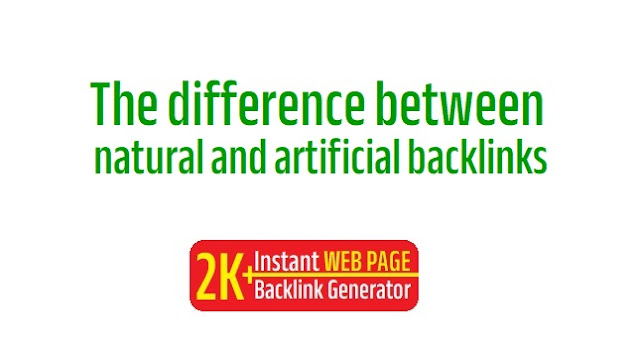Thursday, January 26, 2023
The difference between natural and artificial backlinks
Backlinks, also known as inbound links, are an essential part of SEO as they signal to search engines the popularity and authority of a website. However, not all backlinks are created equal and it's important to understand the difference between natural and artificial backlinks. In this article, we will discuss the difference between natural and artificial backlinks and the impact they have on SEO.
Natural backlinks are links that are earned organically, without any manipulation or intervention. These links are typically the result of high-quality content or a strong online presence. Natural backlinks are considered the most valuable by search engines as they signal that a website has high-quality content and is authoritative in its field. Natural backlinks are also the most sustainable in the long-term as they are not easily replicated and are less likely to be penalized by search engines.
Artificial backlinks, on the other hand, are links that are acquired through manipulation or intervention. These links are often the result of link buying, link farming, and other black hat SEO techniques. Artificial backlinks are considered low-quality by search engines and can harm a website's search engine visibility. Search engines are constantly updating their algorithms to detect and penalize websites that use artificial backlinks, making them a risky and unsustainable strategy.
One of the key differences between natural and artificial backlinks is their quality. Natural backlinks are typically from high-quality websites that are relevant to the content on your website. Artificial backlinks, on the other hand, are often from low-quality websites that have little relevance to the content on your website. Search engines use backlinks as a way to understand the content of a website, so having high-quality backlinks from relevant websites is essential for improving search engine visibility.
Another key difference between natural and artificial backlinks is their diversity. Natural backlinks are typically from a diverse set of websites, which signals to search engines that your website is popular and authoritative. Artificial backlinks, on the other hand, are often from the same websites, which signals to search engines that the backlinks have been artificially acquired. Search engines use link diversity as a way to understand the popularity and authority of a website, so having a diverse set of backlinks is essential for improving search engine visibility.
Another difference between natural and artificial backlinks is that natural backlinks are long-term, sustainable, and hard to replicate, while artificial backlinks are short-term, unsustainable, and easy to replicate. Artificial backlinks are often penalized by search engines, which can harm a website's search engine visibility. On the other hand, natural backlinks are less likely to be penalized and are more sustainable in the long-term.
In conclusion, it's important to understand the difference between natural and artificial backlinks as they have a significant impact on SEO. Natural backlinks are the most valuable and sustainable, while artificial backlinks are low-quality and can harm a website's search engine visibility. Building natural backlinks is an essential part of SEO and can be achieved by creating high-quality content and building a strong online presence.


No comments :
Post a Comment